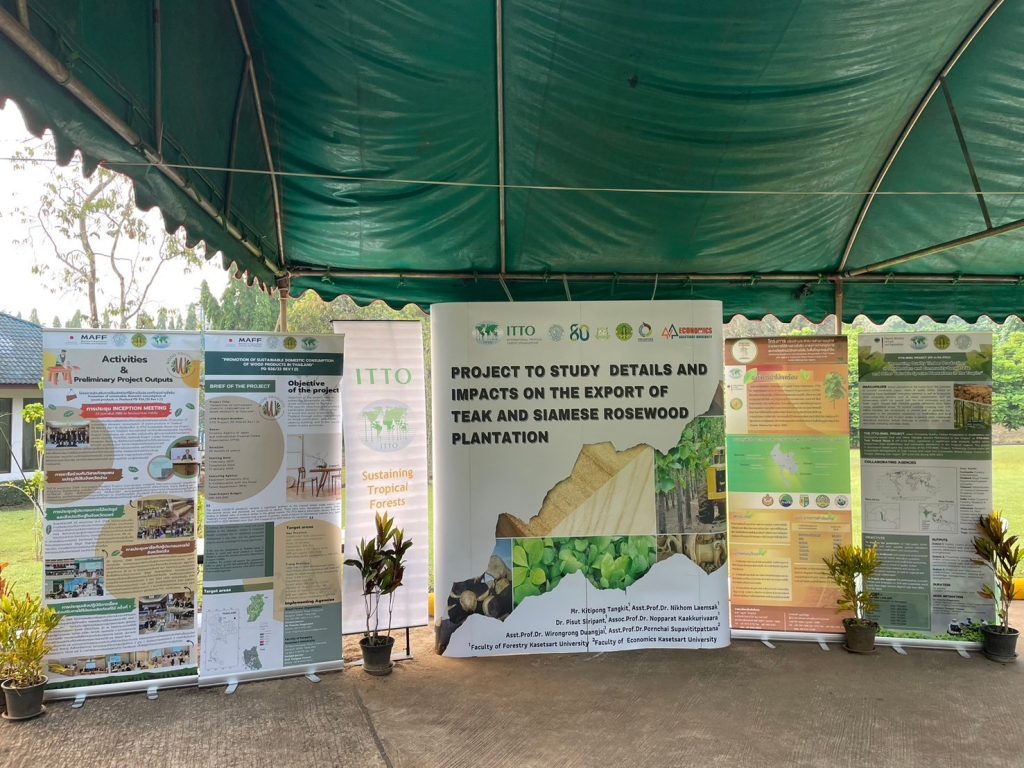ITTO-BMLEH (PP-A/54-331A)
"PROMOTING QUALITY TIMBER PRODUCTION
IN SMALLHOLDERS AND COMMUNITY-BASED TEAK AND
OTHER VALUABLE SPECIES PLANTATIONS
IN THE TROPICS"
The Government of Thailand has set an ambitious target to increase forest cover to 40% of the land area, with 25% allocated for conservation forests and 15% for economic forests. Significant amendments and regulations to forest laws enacted in 2019 aimed at motivating people and smallholders to plant trees, with a target of 4.1 million hectares by 2037 for economic benefits and to enrich the timber trade.
Thailand boasts the second largest area of natural teak forests globally, estimated at 8.7 million hectares (30% of the total area of global teak forests), primarily located in protected areas. Northern Thailand is recognized as the home of teak in the country. Teak logging concessions date back to 1829, but a complete ban on logging in natural forests was enforced in 1989, shifting policy focus towards forest protection and conservation, setting aside wood production targets. Thailand has a history of over 100 years of establishing teak plantations and management that led to an estimated 140,000 hectares of planted teak, with the Forest Industry Organization (FIO) managing around 78,385 hectares, of which 55% are FSC certified. Initial rotation periods of teak were 60 years, later shortened to 30 years, producing an average of 40,000-60,000 cubic meters per year.
Despite the significant teak plantation area, most plantations, including those managed by the Royal Forest Department (RFD), private sectors, and smallholders, still use seedlings from unknown sources of poor genetic quality. Given the 30-year rotation period, long-term investments, quality planting material, and proper silvicultural practices are essential. Sustainable financing mechanisms such as micro-financing and tree collateral are also crucial to encourage smallholders to prolong plantation’s rotation age for better timber quality and economic returns. Additionally, besides teak, valuable timber species like Pterocarpus macrocarpus, Xylia xylocarpa, Afzelia xylocarpa, and Dalbergia cochinchinesis are planted by farmers for various high-value applications, while exotic species like Eucalyptus and Para rubber are commonly grown for pulp, paper, and construction purposes. Introduced to Thailand in 1899, Para rubber has become a significant contributor to the country’s economy. With a total plantation area of approximately 3.5 million hectares, Thailand’s rubber production amounts to 4.8 million tons of latex annually, comprising 34% of the global output and ranking it as the world’s top producer.
Previous activities (October 2023-April 2024)
After signing the MoU with ITTO, Kasetsart University as the Executing Agency jointly organized various activities with the six participating countries as follows:
1. Organized Hybrid Launching Workshop (11-13 October 2023), Bangkok
The project team conducted Hybrid Launching workshop at Rama Garden Hotel in Bangkok and organized a field excursion at FIO Reforestation Station and Smallholder Plantation in Thong Phaphum District, Kanchanaburi Province. With 51 participants, including 15 onsite and 36 online attendees, delegates from each participating country introduced potential project members and discussed the situation of smallholder teak and other species plantations in each country. Following the Bangkok meeting, participants visited FIO’s Teak Plantation at Kroeng Krawia Reforestation Station in Thongphaphum District, Kanchanaburi Province. They also toured smallholder plantations, exploring opportunities for micro-finance mechanisms (tree bank), passive income from carbon credits, and other economic incentives, while addressing market needs and capacity issues.

2. The 59th ITTO Council Meeting
ITTO invited Prof. Yongyut Trisurat to the 59th ITTC meeting in Pattaya, Thailand, held from 13-17 November 2023. During the meeting, Prof. Trisurat presented achievements of the ITTO-BMEL Teak Project Phase I and outlined the project context for Phase II on 14 November 2023. An exhibition showcasing achievements and planned activities for both phases was also arranged. Prof. Trisurat engaged in discussions with Matthias Schwoerer of the Ministry of Food and Agriculture, Germany as well as National Coordinators and high-ranking officials from Cambodia, India, Indonesia, Togo, Thailand, and Vietnam to further discuss the project’s context and objectives.

3. Organized an Online Launching Workshop on 25 January 2024
The Project Team convened an Online Inception Meeting with 20 delegates from Cambodia, India, Indonesia, Thailand, Togo, and Vietnam. The meeting aimed to review the inception report and approve the 1st year Project Operation Plan. Additionally, the names of the Project Steering Committee (PSC) and the Project Technical Committee (PTC), appointed by the President of Kasetsart University, were reported and acknowledged. The PSC members approved the Inception report and the proposed workplan. It’s noted that the MoU signing between ITTO and India and Indonesia were under internal review by the corresponding countries.

4. Established Exhibition on World Forestry Day
The RFD invited the project to organize an exhibition on smallholder teak and economic plantations for World Forestry Day on 21 March 2024 in Thong Phaphum District, Kanchanaburi province. Alongside the public, local residents and youth, the exhibition was visited by the Secretary of the Ministry of Environment and Natural Resources, the Deputy Director-General of the RFD, and senior RFD officials.


5. Organized Teak Plantation and Silvicultural Practices on 27-28 March 2024
The Thailand component organized the 1st training workshop on Teak Plantation and Silvicultural Practices for Smallholders in Nan Province, aiming to introduce theory and practice of teak plantation, national policy, and economic value of planted teak. Instructors included Prof. Yongyut Trisurat (Regional Project Manager), Dr. Suwan Tangmitcharoen (RFD and Chair of the Project Technical Committee), Mr. Tosaporn Wacharangkul, and Mr. Boonlerd Srisuksai as invited speakers. Following the lectures, participants visited a commercial teak plantation in Pua District, Nan province, managed by Sri Trang Rubber and Plantation Ltd. Company, covering approximately 2,100 rais or 650 hectares. The company utilizes modern technology and intensive silvicultural practices, allowing local people to engage in cash crop intercropping during 1-3 years, promoting co-benefits and cost-saving measures for weeding and fire prevention in plantations.

